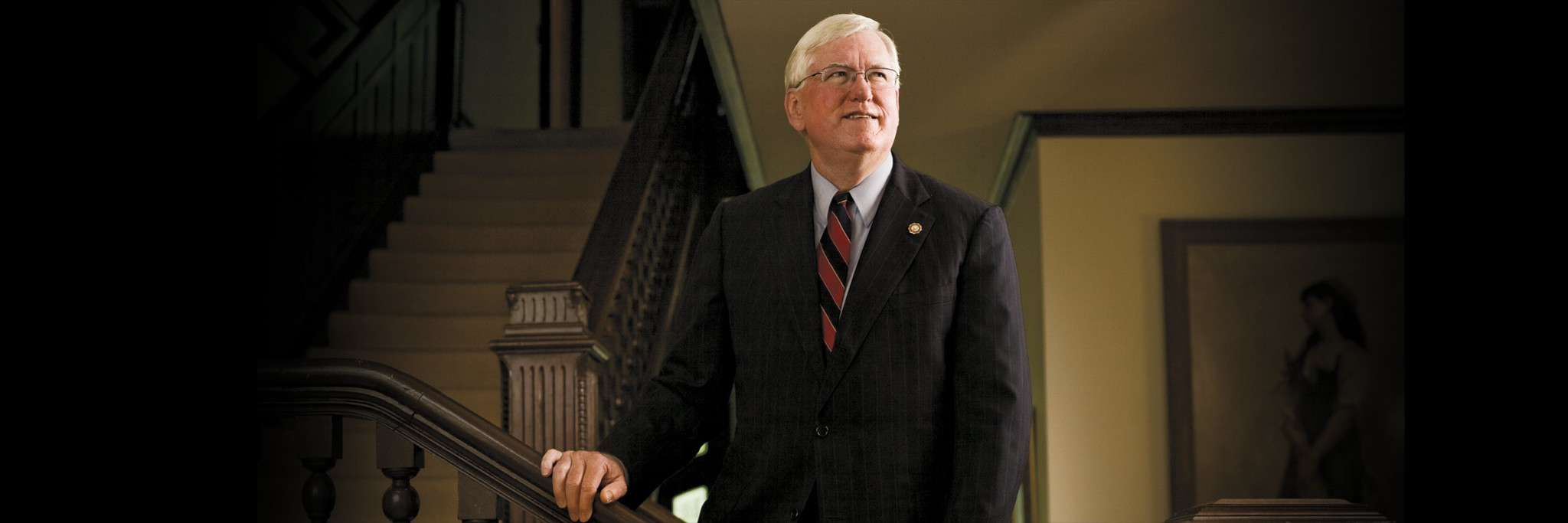Denison, in many ways, is like a town within the village. After all, more than 650 people are employed by the college in diverse faculty and staff roles; 100 more work on campus through contractors in areas like dining services and telecommunications; and roughly 1,000 students draw a paycheck for part-time on-campus employment. Gross annual payroll and benefits amount to $56 million. The college administers almost 1,000 acres of land and nearly 100 buildings of all descriptions: from classrooms, laboratories, and residence halls to gymnasiums, theaters, and houses for visiting and junior faculty. Two thousand, one hundred and fifty persons—our students-—live on campus for nine months of the year, together with a number of assistant deans for residence life. This year, Denison will have about $105 million in operating expenses (covered, thankfully, by income from both operating and nonoperating sources). Total assets, including both investments and physical plant, are valued at over $1 billion. During each of my 15 years in the Denison presidency, we have had millions to tens of millions of dollars’ worth of renovation or new construction taking place on campus to sustain the college’s success. No, Denison is not a Fortune 500 operation, but there is a lot of business going on.
Yet, leading this college is less like the leadership required of a for- or nonprofit corporate CEO and much more like that provided by the mayor of a municipality. And it’s not just because we don’t see ourselves, as a matter of both mission and culture, as being a business, or even because I stand in a long line of Denison presidents who’ve been trained as teachers/scholars rather than as accountants, financiers, or facilities managers. Rather, it is, in the first place, because we are literally city-like in so many ways. There are the faculty, staff, and contract employees who are primarily denizens of the day plus dozens to hundreds of daily campus visitors, mail and package couriers, and other men and women with specialized skills whom we ask to meet the often unexpected needs of a complex community. On some days, there are probably more people on our campus than throughout the balance of the Granville municipality. We have miles of campus roads, sidewalks, pipes, and electrical conduit—and thousands (yes, thousands!) of stairs up and down our hills. Denison has a steam heating plant, a safety and security department, repair shops, a motor vehicle fleet, a large information technology unit, dining halls and snack bars, a couple of retail stores, and extensive indoor and outdoor athletic and recreation facilities. And we have snowplows! Who could forget this as March comes into Granville again as a lion? With all this “stuff” taking place on our campus, it’s no wonder that much of the time I feel like I’ve got a little city by the tail.
But what I really mean about the “mayoral” quality of a college presidency is less about maintaining the structure of the place than about the nature of leadership that a college demands. So much of what I and others in my role elsewhere do might best be described as “constituency work.” Think of just how many constituencies make up a college. There are the three constituencies I see daily: students, faculty, and staff. But nearly every day, I’m involved with some members of at least three more: alumni, parents, and philanthropic supporters of Denison (who are often also graduates and family members). The board of trustees, the “owners” in law of the college, is itself a constituency that demands respect and care. It shouldn’t surprise you that the residents of Granville also believe that they have a stake in “their” college. And prospective students, their parents, and school counselors are also constituency groups who are critically important to Denison’s mission and to Denison’s future.
Perhaps you’re beginning to get a sense of where much of my time and energy have gone for the last 15 years. They’ve gone to listening to these varied constituencies, being responsive to them, providing feedback to their members—and most central of all, working to get them all moving down the same road together in the same direction to arrive at Denison’s future. Can this be a challenge? You bet. Consider how each feels that it has an important stake, often the most important stake, in the current affairs and future prospects of the institution. And it is certainly easier for members of constituencies to focus on the customarily small points of difference that they have with other groups rather than upon the broad and deep areas of agreement running through all of them.
And that is what has made this work as president so rewarding for me since July 1, 1998. There is, I’ve come to find, a widely shared understanding of Denison, pride in Denison, and expectation for Denison. It has been fun and affirming to identify these commonalities, crystallize them into plans and actions for the college, and share them back with all those who make up “greater Denison.” And along the way, I’ve made so many friends. I get one more Denison Magazine column this summer before my retirement on June 30, so this is not goodbye. But as you read this issue of the magazine and see so much of what is going on with Denison and Denisonians, I hope you’ll appreciate with me the special privilege I’ve had of being the “mayor.”

